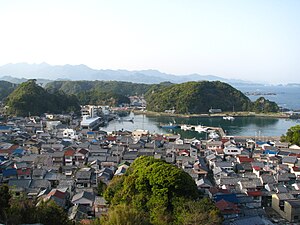Taiji, Wakayama
|
Taiji 太地町 |
|
|---|---|
| Town | |

Central Taiji, as viewed from the south, with the marina in the center and the Pacific is to the right
|
|
 Location of Taiji in Wakayama Prefecture |
|
| Location in Japan | |
| Coordinates: 33°36′N 135°57′E / 33.600°N 135.950°ECoordinates: 33°36′N 135°57′E / 33.600°N 135.950°E | |
| Country | Japan |
| Region | Kansai |
| Prefecture | Wakayama Prefecture |
| District | Higashimuro |
| Government | |
| • Mayor | Kazutaka Sangen |
| Area | |
| • Total | 5.96 km2 (2.30 sq mi) |
| Population (31 March 2011) | |
| • Total | 3,428 |
| • Density | 541/km2 (1,400/sq mi) |
| Symbols | |
| • Tree | Evodia meliifolia |
| • Flower | Grand Crinum Lily |
| • Bird | Blue Rock-thrush |
| Time zone | Japan Standard Time (UTC+9) |
| City hall address | 649-5171 |
| Website | www |
Taiji (太地町 Taiji-chō?) is a town located in Higashimuro District, Wakayama Prefecture, Japan.
As of March 31, 2011, the town had an estimated population of 3,428 and a population density of 541 persons per km². The total area is 5.96 km². Taiji is the smallest local government by area in Wakayama Prefecture because, unlike others, it has not experienced a merger since 1889, when the village of Moriura was merged into Taiji. Taiji shares its entire overland border with the town of Nachikatsuura and faces the Pacific Ocean.
Taiji has long been well known as a whaling town and spearheaded the development of more sophisticated whaling techniques in the 17th century. In 1988, a ruling by the International Whaling Commission (IWC) caused Taiji to suspend commercial whaling. However, the town continues to hunt small whales and dolphins. Taiji's annual dolphin hunt is a subject of controversy and the town faces continued pressure from protest groups.
Taiji has been primarily known as a whaling town. Japanese traditional whaling techniques were developed here in the 17th century, and the commercial hunting and catching of dolphins remains a major source of income for its residents to this day.Wada Chūbei organized the group hunting system (刺手組) and introduced a new handheld harpoon in 1606. Wada Kakuemon, later known as Taiji Kakuemon, invented the whaling net technique called Amitori hō (網取法) to increase the safety and efficiency of whaling. This method was applied for more than 200 years.
The people of Taiji experienced great loss and economic hardship after an incident in 1878, when a large group of whalers were lost at sea while while hunting a whale. The whale was harpooned, but was strong enough to pull the whaling boats out to sea. Refusing to cut the whale loose until it was too late, many whalers drowned or were otherwise adrift and lost at sea as a result. Around one hundred whalers died in the course of this event. After the Russo-Japanese War, Taiji's whaling industry became buoyant again as it became a base for modern whaling. When the practice of Antarctic whaling started, Taiji provided crews for the whaling fleet. In 1988, Taiji suspended commercial whaling as a result of a ruling by the International Whaling Commission (IWC).
...
Wikipedia

